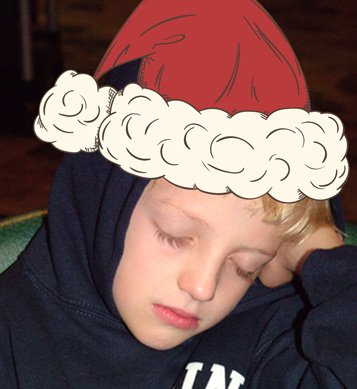Managing fatigue over the Christmas Season (in Australia)
Fatigue has the potential to be a real party pooper. For everyone, not just people with hypermobility. But as i’m sure you’re well aware, people with hypermobility - young kids and teenagers in particular - can be quite debilitated by fatigue. Add in the hot weather of the Australian summer and the combination could cause quite the party-fizzer.
Managing fatigue
So what can we do to manage fatigue over the Christmas Season?
Here are some of my thoughts - I’d be interested to hear if you have any additional ideas to share with others.
Pacing is really the key.
Pacing requires planning. It doesn’t mean you can’t be spontaneous at all, but generally speaking a life with hypermobility is a little more planned than for those without, as you would already know. Don’t expect your child to go out shopping or for a play date in the morning and then back up and go to an afternoon party or event; don’t even expect their behaviour to be great in the afternoon. They are likely to be exhausted, just from the excitement and activity of the morning.
With that in mind, try to spread out events as much as possible - this may require declining some invitations in preference of others. If your child is particularly fatigue prone then limiting it to one event per day (or weekend if necessary) might be the best idea.
Don’t do back-to-back outings or events. This can be a recipe for disaster. If you have to do two things in one day, make sure there is a break in between for some down time… even a nap, if necessary. Leave early or arrive late. Remember your child’s health & wellbeing (and by extension your sanity) is more important than timing.
Sleep.
Make sure you’re sticking to normal bedtimes & wake up times as much as possible. This will ensure your child is still getting adequate sleep for the day and also will prevent the dreaded back to school sleep routine change that always ends up occurring.
With older children, if a nap is needed during the day, especially on particularly busy or hot days, it’s not the end of the world. Just try not to make it too long or a regular occurrence.
Look after the body.
Keep cool. This is a big one. Lots of people in the general population say that the heat just saps their energy. I know it often does for me. On those REALLY hot days, like a few we’ve had in Sydney recently, try to stay out of the sun, hang out in places with air-conditioning, or at least a fan. Some people with hypermobility have trouble regulating their body temperature, especially when they get too hot. If necessary, have a cool shower or go for a quiet dip in a pool (or bath) to cool down.
Stay hydrated. This is obvious, and applies to EVERYONE. But if your child is prone to feeling faint or dizzy, staying hydrated in hot weather is even more important. Staying hydrated will keep blood pressure levels more stable. You should obviously follow your doctors instructions as to what you keep hydrated with.
Set some boundaries.
If you are looking at your diary and seeing that you have weekend after weekend full of events, it’s probably time to get out the red pen and start knocking some out. Un-invite yourself. Change your RSVP to 'cannot attend'. You know your child best, you know what they can usually handle. Give them a little bit of extra breathing room during the festive season.
Remember, just because it’s Christmas doesn’t mean you or your child have acquired super powers (unless Santa was especially generous). That means that you can’t expect MORE of your child at this time of year. You also can’t expect much more of yourself. Don’t run yourselves ragged trying to meet others’ expectations. Set some boundaries….and stick to them.
Change your expectations.
The festive season also coincides with school holidays. That means for a lot of kids they are more active (playing outside, going shopping, going to the beach, playdates etc) than they are on school days. That means they are expending more energy, or at least the same amount of energy via a different method. They may be using muscles they don’t usually use. That means they may also be more sore as well as fatigued. Just remember that your child’s behaviour usually changes when they experience pain and when they experience fatigue. The festive season is a time for altering your expectations a little. It’s a crazy time for everyone; remember its a little more crazy for them.
Remember what’s important.
Downtime, R&R and being with the people you love & enjoying spending time with is most important. Don’t forget it.

